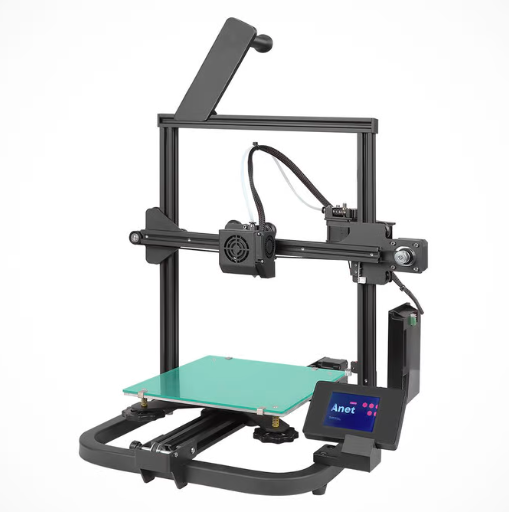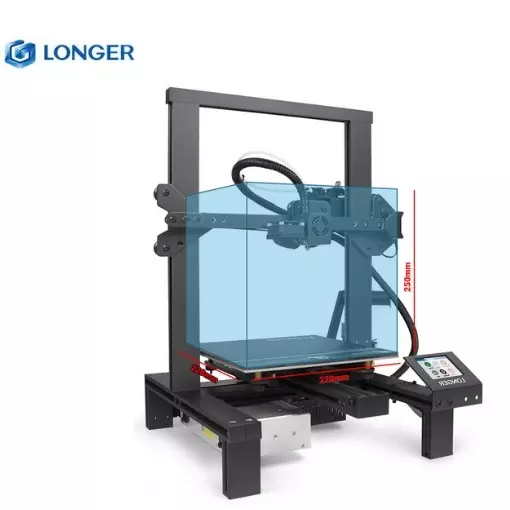Compare A8 V2 vs LK4 X
Comparison between the best 3D printers
Choose the best 3D printer at the best price. The cheapest 3D printers are here.
Buy a 3D printer here with 3D Fila.
 |
 |
|
| Model | A8 V2 |
LK4 X |
| Printing Material | Filament | Filament |
| Buy Filament for Anet A8 V2 | Buy Filament forLonger 3D LK4 X | |
| Estimated price | $129,00 | $299,00 |
| Manufacturer | Anet | Longer 3D |
| Release Year | 2021 | 2022 |
| Print Volume [mm] | 220x220x250 | 220x220x250 |
| Printer Size [mm] | 428x441x486 | 465x485x615 |
| Weight [kg] | 6,2 | 9,8 |
| Power Loss Recovery | NO | YES |
| Enclosed printer | NO | NO |
| Bed Leveling | Manual | Automatic |
| Filament End Sensor | NO | YES |
| Bed type | Heated | |
| Power supply system | Bowden | Bowden |
| Standard nozzle | 0,4 | 0,4 |
| Maximum Nozzle Temperature [°C] | 230 | 250 |
| Maximum Bed Temperature [°C] | 100 | |
| Maximum printing speed [mm/s] | 150 | 120 |
| Filament holder | YES | YES |
| Camera for supervision | NO | NO |
| Recommended filaments | PLA | PLA, TPU, ABS, PETG |
| Recommended slicers | Cura, Simplify, Slic3r, IdeaMaker | Cura, Simplify, Slic3r |
| Maximum Resolution [mm] | 0,1 | 0,1 |
| Processor | 8 bits | |
| Display | Display touchscreen 2,8'' | Touchscreen TFT 4,3'' |
| Power Supply | 110/220V / 250W | 12V / 320W |
| Connectivity | SD / USB | SD / USB |
| Operating systems | Windows, Mac, Linux | Windows, Mac, Linux |
| Date of registration in the system | 2022-11-10 | 2021-04-15 |
| Release date | 2021 | 2022 |
| Extra features | The Anet A8 V2 is a Cartesian-XZ type 3D printer with a build volume of 220 x 220 x 250 mm, Ender 3 design and V-slot assembly. It has a 32-bit motherboard and touchscreen interface, promising ease of use. It uses open source firmware and has thermal failure protection. It stands out for its cable organization and the absence of a heated bed, focusing on energy savings and PLA printing. It comes with an external power adapter, aiming at greater safety, especially for beginners and educational use. | Longer LK4 X offers intelligent 16-point auto-leveling and dual direct-gear extruders for precise filament control, compatible with multiple materials. It features an ultra-quiet 32-bit motherboard and open-source firmware, promoting creative freedom. Its PEI film platform ensures strong adhesion and easy model removal. Includes resume printing functions and filament out-of-stock protection. Assembly is simple, with 95% pre-assembled. It has a 4.3-inch touch screen, dual fan kit, low power consumption, manual belt tensioners and improved Teflon tube. |
| Support for multiple colors and materials (AMS and CFS) | NO | NO |
Notes * |
||
| Cost-benefit | 6 / 10 | 7 / 10 |
| Hardware | 0.5 / 10 | 2.4 / 10 |
| Tela | . | . |
| Print volume | 3 / 10 | 3 / 10 |
| Performance | 1 / 10 | 1 / 10 |
Conclusion |
| In comparing the Anet A8 V2 and the Longer LK4 X 3D printers, both models provide similar print volumes and are suited for PLA printing. However, the Longer LK4 X comes with a number of advanced features that enhance its usability and functionality, justifying its higher price point. The Anet A8 V2, while being the more affordable option, features a manual bed leveling system and lacks power loss recovery and filament end sensors, making it less convenient, especially for beginners. Its build focuses on simplicity and energy efficiency—beneficial for educational purposes but may restrict more experienced users who desire greater versatility and ease of use. On the other hand, the Longer LK4 X boasts automatic bed leveling, filament sensors, and power recovery features, offering a significantly smoother printing experience. Its compatibility with a wider range of filament types increases creative possibilities, and the larger touchscreen interface aids in user interaction. Despite its heavier weight and slightly lower maximum printing speed, these trade-offs are mitigated by its advanced capabilities and ease of assembly, which cater to both novices and seasoned users alike. In summary, if budget is the primary concern, the Anet A8 V2 serves as a solid entry-level printer for basic PLA projects. However, for those willing to invest more for enhanced functionality, durability, and user convenience, the Longer LK4 X represents a far superior choice in the long run, likely offering better value given its array of features. Ultimately, the decision hinges on the buyer's priorities—cost-effectiveness versus advanced features and ease of use. |

